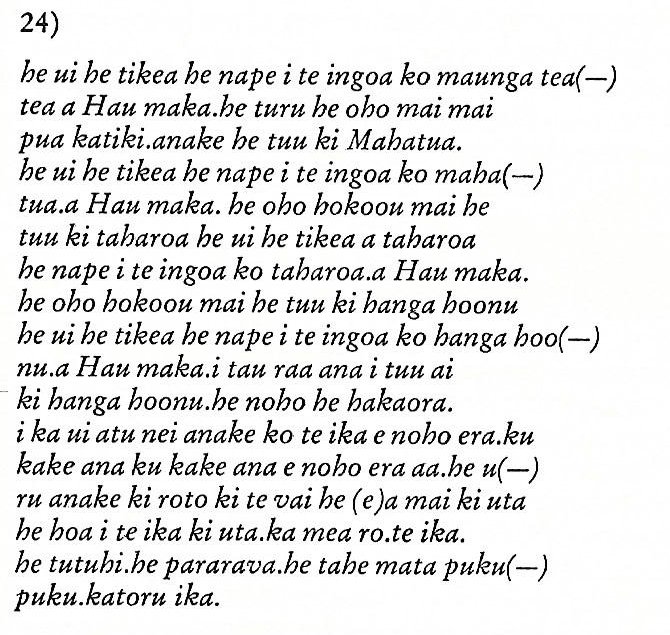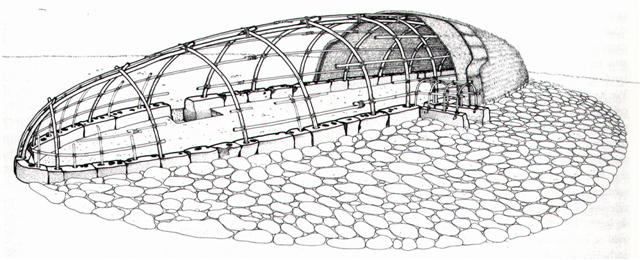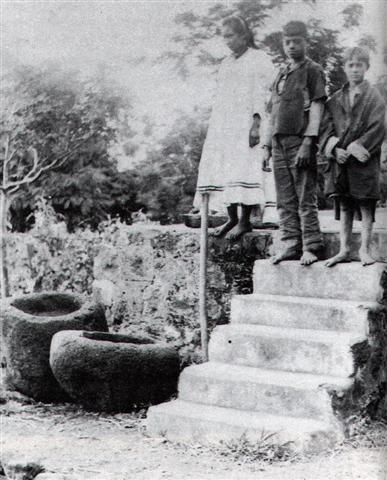
| he ea ananake.he amoamo i te kai
he oho |
Then they all got up,
carried their provisions [te kai] on their
shoulders, went straight ahead, and followed the
path [he oho i te ara] of the dream soul of
Hau Maka. |
| he hakatika he oho i te ara.oho
mai era.o |
| Atiga. Angle,
corner. Mgv.: hatiga, the corner of a house;
hatiga, hatihatiga, the joints or
articulation of a limb. Mq.: fatina,
hatika, joint, articulation, link. Ta.:
fatiraa, articulation. Churchill.
 |
| te kuhane o Hau maka.he tuu ki
hua reva |
They came to Hua Reva
and said, 'This is Hua Reva A Hau Maka!'
They went on and reached [he tuu]
Akahanga, took a look at it [he ui] and
looked around [he tikea]. They said: 'This is
it!' and gave the name [he nape i te ingoa]
'Akahanga A Hau Maka'.
They went on and came to Hatinga Te Kohe and saw
that in this place the kohe plant had been
broken [hati]. They all said [he ki
anake], 'Here it is, the kohe plant,
troop of young men!'
This kohe plant had been broken by the
feet [te vae]of the dream soul and therefore
they gave the name 'Hatinga Te Kohe A Hau Maka'.
They went on and came to Roto Iri Are. Again [hokoou]
they said,'Here it is, Roto Iri Are' and named (the
place) 'Roto Iri Are A Hau Maka'. |
| he ki i ana
nei ko hua reva a Hau maka.he oho |
| hokoou he tuu ki akahanga he ui
he tikea.he ki |
| ki i (a)na
nei he nape i te ingoa.ko akahanga.a |
| hau maka.(h)e
oho hokoou he tuu ki hatinga te |
| kohe.he ui ko te kohe ku hati ana
he ki anake |
| i ana nei te kohe e kau a repa e
tau kohe hati |
| era i te vae o te kuhane.he
nape i te ingoa ko |
| hatinga te
kohe a Hau maka.he oho hokoou |
| he tuu ki roto iri are.he ki
hokoou i ana nei |
| a roto iri are
he nape i te ingoa ko roto iri
are |
| a Hau maka. |
|
E:23 |
| he oho hokoou he tuu kia tama he
tikea he |
They went on and came
to Tama. They looked around and said, 'This is
Tama.' They gave the name 'Tama, an evil fish (he
ika kino), a very long nose (He ihu
roroa).'
Again they went on and came to One Tea. They saw
it, looked around, and gave the name 'One Tea A Hau
Maka'.
Then they went on and came to Hanga Takaure.
There they gave the name 'Hanga Takaure A Hau Maka'.
They made camp and rested at the Bay of Flies for
a week (etahi pohitu).
On the eighteenth day of the month of July
('Anakena'), they went on from Hanga Takaure. |
| ki i ana nei ko tama.he
nape i te ingoa ko tama |
| he ika kino
he ihu roroa.he oho hokoou he tuu |
| ki one tea he ui he tikea
he nape i te ingoa ko one |
| tea a Hau
maka.he oho hokoou he tuu ki hanga |
| takaure he
nape i te ingoa ko hanga takaure a Ha(-) |
| u maka.he
noho he hakaora i hanga takaure |
| etahi pohitu. |
| i te
angahuru mavau o te anakena.i oho |
| ai.mai hanga takaure. |
|
?
The lower thirds of
pages E:25 and E:26 have been cut off. Here, it
seems, also page E:23 has been severed
in a similar manner. |
They climbed uphill, went on, and
reached Poike. When they arrived, they looked around
and named (the place) 'Poike A
Hau Maka'. They climbed up farther to Pua
Katiki. When they arrived there, they looked around
and named (the place) 'Pua
Katiki A Hau Maka'.
They came down from the height, from the
mountain, from Pua Katiki, and reached Maunga
Teatea. |
|
E:24 |
| he ui he tikea
he nape i te ingoa ko maunga
tea(-) |
They looked around and
gave the name 'Maunga Teatea A Hau Maka'. They all
descended [he turu], they all came down from
Pua Katiki.
They reached Mahatua, saw it, looked around, and
gave the name 'Mahatua A Hau Maka'.
Then they went on and came to Taharoa. They saw
it, looked around, and gave the name 'Taharoa A Hau
Maka'. |
| tea a Hau
maka.he turu he oho mai mai |
| pua katiki.anake he tuu ki
Mahatua. |
| he ui he tikea
he nape i te ingoa ko maha(-) |
| tua.a Hau
maka. he oho hokoou mai he |
| tuu ki taharoa he ui he tikea a
taharoa |
| he nape i
te ingoa ko taharoa.a Hau maka. |
| he oho hokoou mai he tuu ki hanga
hoonu |
Again they went on and
reached Hanga Hoonu. They saw it, looked around, and
gave the name 'Hanga Hoonu A Hau Maka'. On the
same day, when they had reached the Bay of Turtles,
they made camp and rested [he hakaora]. |
| he ui he tikea
he nape i te ingoa ko hanga
hoo(-) |
| nu.a Hau
maka.i tau raa ana i
tui ai |
| ki hanga hoonu.he noho he
hakaora. |
|
Tui. 1. To
sew mats, to make strings. E-tahi tuitui reipá i
Te Pei, ekó rava'a e-varu kaukau; i-garo ai i
Hiva, i te kaiga, a necklace of mother-of-pearl
is on te Pei, few will find it (lit: eight
groups of people); it has remained in Hiva,
in our homeland. 2. The three stars of Orion's Belt.
Vanaga. |
| i ka ui atu
nei anake ko te ika e noho era.ku |
They all saw the fish
that were there, that were present in large numbers
- Ah! |
| kake ana ku kake ana e noho era
aa.he u(-) |
| Atu. Particle of
meaning opposite to that of mai; it refers to
the second or third person, expressing movement
away: ka-avai-atu, give it to him:
he-oho-atu au, I am going there, after you;
i-oho-atu-era, when I had gone there. Vanaga. 1.
a. Directive, of motion from the speaker. b.
Somewhat expressive of the comparative degree. 2.
Pupil; hakaatu, proof; hare hakaatuga,
schoolhouse, class. 3. (hakaatu), to presage.
4. (hakaatu), mark, object. Churchill. |
| ru anake ki roto ki te vai he
(e)a mai ki uta |
Then they all went into
the water [he uru ki roto ki te vai], moved
toward the shore, and threw the fish (with their
hands) onto dry land. There were great numbers (?
ka-mea ro) of fish.
There were tutuhi, paparava, and
tahe mata pukupuku. Those were the three kinds
of fish. |
| he hoa
i te ika ki uta.ka mea ro.te ika. |
| he tutuhi.he pararava.he tahe
mata puku(-) |
| puku.katoru ika. |
| Hoa. 1. Master,
owner; tagata hoa papaku, owner or relative
of a dead; hoa manu, 'bird master', that is,
he who received the first egg at the annual
festivals in Orongo; he to'o mai e te hoa
manu i te mamari ki toona rima, he ma'u, he hoko,
the 'bird master' receives the egg in his hand and
carries it, dancing. 2.Friend,
companion: e ga hoa ê! 3. To cast away, to throw
away, to abandon, perhaps also to
expel. 4. To confess a sin; he hoa i te
ta'u: term used of a category of rongorongo
boards (see ta'u). Vanaga. 1. Friend;
repa hoa, friend (male), comrade, companion,
fellow; to confide; repa hoa titika, faithful
friend; garu hoa, friend (either sex); uha
hoa, friend (female); hoa kona, native T.
2. To abandon, to debark, to cast, to launch, to
anchor, to let go, to give up, to reject, to
repudiate, to suppress, to cut off, to jerk out, to
proscribe, to reprove; hoahoa, to upset, to
destroy. Churchill. Ka. Particle of the
affirmative imperative, of cardinal numerals, of
independent ordinal numerals, and of emphatic
exclamation, e.g. ka-maitaki! how nice!
Vanaga. Ká. 1. To light a fire in order to
cook in the earth oven (see umu): he-ká i te umu,
he-ká i te kai. 2. Figuratively: to fire up the
soul. To put oneself in a fury (with manava):
ku-ká-á toona manava he has become furious.
Vanaga. 1. Of T. 2. Imperative sign; ka oho,
ka tere, ka ea, begone!; ka ko iha,
a greeting T; ka mou, hush; ka oho,
goodbye. 3. Infinitive sign; mea meitaki ka rava,
a thing good to take; ka harai kia mea, to
accompany. 4. A prefix which forms ordinals from
cardinals. 5. The dawning of the day. 6. Different
(? ke). Churchill.
Mea.
1. Tonsil, gill (of fish). 2. Red (probably because
it is the colour of gills); light red, rose; also
meamea. 3. To grow or to exist in abundance in a
place or around a place: ku-mea-á te maîka,
bananas grow in abundance (in this place);
ku-mea-á te ka, there is plenty of fish (in a
stretch of the coast or the sea); ku-mea-á te
tai, the tide is low and the sea completely calm
(good for fishing); mau mea, abundance.
Vanaga. 1. Red; ata
mea, the dawn.
Meamea, red,
ruddy, rubricund, scarlet, vermilion, yellow;
ariga meamea,
florid; kahu meamea
purple; moni meamea,
gold; hanuanua
meamea, rainbow;
pua ei meamea,
to make yellow.
Hakameamea, to redden, to make yellow. PS
Ta.: mea,
red. Sa.: memea,
yellowish brown, sere. To.:
memea,
drab. Fu.: mea,
blond, yellowish, red, chestnut. 2. A thing, an
object, elements (mee);
e mea,
circumstance; mea ke,
differently, excepted, save, but;
ra mea, to
belong; mea rakerake,
assault; ko mea,
such a one; a mea
nei, this;
a mea ka,
during; a mea,
then; no te mea,
because, since, seeing that;
na te mea,
since; a mea era,
that; ko mea tera,
however, but.
Hakamea, to prepare, to make ready. P
Pau., Mgv., Mq., Ta.:
mea, a thing. 3. In order that, for.
Mgv.: mea,
because, on account of, seeing that, since. Mq.:
mea, for.
4. An individual;
tagata mea,
tagata mee,
an individual. Mgv.:
mea, an individual, such a one. Mq.,
Ta.: mea,
such a one. 5. Necessary, urgent;
e mea ka,
must needs be, necessary;
e mea,
urgent. 6. Manners, customs. 7. Mgv.:
ako-mea,
a red fish. 8. Ta.:
mea, to do. Mq.:
mea, id.
Sa.: mea,
id. Mao.: mea,
id. Churchill.
Ro. 1.
Of, concerning. 2. Yet, nevertheless, still;
kakore ro,
our; ka kikiu ro,
to importune (? no).
Churchill. |
|
Tutu. 1.
Circle of fishing nets arranged in the shape of a
funnels or baskets. 2. To light a fire; he-tutu i
te ahi: to burn something. 3. To hit, to strike,
to beat. Tûtú, to shake (something) clean of
dust or dirt; he-tûtú te oone o te nua, to
shake the dirt off a nua cape. Tutuhi,
to reject the responsibility for a mistake onto one
another, to blame one another for a mistake (see
tuhi). Tutuki, to stumble, to trip. O
tutuki te va'e, in order not to trip. Tutuma,
firebrand, partly burnt stick. Tuturi, to
kneel. Vanaga. 1. To beat bark for cloth. PS Pau.,
Mgv., Mq., Ta.: tutu, id. Sa., To., Fu.:
tutu, id. 2. A broom, to sweep, to clean. Mq.:
tutu, to beat out the dust. 3. To shake, to
winnow. Mgv.: tutu, to tremble, to leap. Mq.:
tutu, to shake. 4. To kindle, to light, to
ignite, to set fire, to burn. Mq.: tutu, to
burn, to set fire. 5. To stand; hakatutu, to
set joists. P Mgv., Mq.: tutu, to stand
upright. Ta.: tu, id. Tutua (tutu
1): board on which bark is beaten into cloth. PS
Mgv.: tutua, a cloth beater. Mq., Ta.:
tutua, wood on which cloth is beaten. Sa., Fu.:
tutua, id. Tutui: tutui ohio,
chain, tutui kura, shawl. Mq.: tuitui kioé,
chain. Tutuki: shock, contusion, to run
against, to collide; tukukia, to run foul of.
P Pau.: tukituki, to strike, to pound, to
grind. Mgv.: tukia, to strike against, shock,
concussion. Mq.: tutuki, id. Ta.: tui,
id. Tutuma: 1. (tutu - ma) a
live coal. 2. Tree trunk T (? tumu).
Tutumata, ligament of the eye, orbit, eyelid. T
(tutumate, eyelid G). Tutuu,
bristling. Churchill.
Papa. 1.
Underground rock; motionless; rocky sea bottom;
large flat stone; figuratively: tagata papa
important man, author of great works. 2. Wooden
plank currently used much like a surf-board in the
sport called garu; it was formerly called
papa gaatu mo te garu, because it was made from
dry totora leaves woven into the shape of a
plank. 3. To line up things side by side on a flat
surface, for instance, to line up fish on top of a
flat stone. Vanaga. Shoulderblade. Papapapa,
a chill, to shiver, to tremble, to shudder.
Churchill.
Taheta. Name of the concave stones used as
water tanks in many of the ancient hare paega
houses. Vanaga. Fountain, spring; taheta pu,
spring; pokopoko taheta, concave. Churchill. |

|

